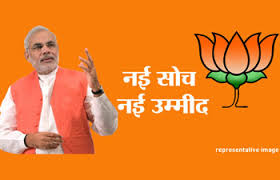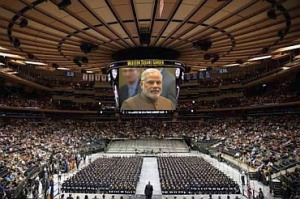The BJP Government must live upto its promises of providing a secular government without any ideological baggage of the past
In 2014, when BJP was entrusted by the electorate to lead the nation for the next 5 years, the promises and the commitment expressed by Modi and his entire team had ample clarity : to ensure maximum governance and minimum government interference. Their idea was to undo all the interferences by earlier governments for political gains and let them function independently. Increasingly, a lot of our public institutions were are stress at large and showed signs of fatigue and dependancy on the political class for their actions and considerations. The government vowed to change this status quo and let our instituions run on merit and capabilities, instead on the whims and fancies of their political superiors or their ideologies.
In just over a year since these concerns were intermittently put to rest, the government seems to have backed away from its promises in pursuing its ideologies that go well beyond the scope of the constitution and the principles that we pride ourselves on. The government that entered power with the hope that it would usher an era of governance that is seen as impartial and free of bias is now engaging in practices that lead us to believe that there is a systematic agenda to further there Hindutva ideologies in a discreet yet, organised manner. This is dangerous for the society at large as it has the power to influence large sections of the population in an undemocratic and uninformed manner.
 Gajendra Chouhan’s appointment as the chairman of Film and Television Institute of India (‘FTII’) was one such instance. He is seen as a man who has Hindutva inclinations and is perceived as one who is very close to the BJP and the Sangh parivar. In a prestigious institute like the FTII that deals with freedom of speech and creative expression and which involves a medium that has a wider reach than most information mediums, this move has the evil power of suppressing speech and ideas that go against personal and political ideologies. Such a move has not only been vehemently opposed by prominent individuals in the film industry like Anupam Kher and Rishi Kapoor but also by students who feel an impartial and capable chairman is the need of the day and men like Chouhan have the capacity to dismiss voices that go against a particular mindset and ideology.
Gajendra Chouhan’s appointment as the chairman of Film and Television Institute of India (‘FTII’) was one such instance. He is seen as a man who has Hindutva inclinations and is perceived as one who is very close to the BJP and the Sangh parivar. In a prestigious institute like the FTII that deals with freedom of speech and creative expression and which involves a medium that has a wider reach than most information mediums, this move has the evil power of suppressing speech and ideas that go against personal and political ideologies. Such a move has not only been vehemently opposed by prominent individuals in the film industry like Anupam Kher and Rishi Kapoor but also by students who feel an impartial and capable chairman is the need of the day and men like Chouhan have the capacity to dismiss voices that go against a particular mindset and ideology.
The FTII appointment would have been ignored if it was an isolated example of selection based on considerations other than merit and experience alone. In November the government appointed a Padma Bhushan awardee, Lokesh Chandra, aged 87 as the head of the Indian council of Cultural Relations (‘ICCR’). If the age wasn’t baffling enough, his comments reaffirmed fears that his loyalties towards Narendra Modi was a compelling enough reason for this selection. Post appointment, he referred to Modi as virtually an ‘incarnation of God’. Further, he was quoted wanting to organise Ramayana and Mahabharata-based programmes with the south-east Asian countries like Indonesia, Cambodia, Laos as they have living traditions drawn from these epics. If this was one of his many agendas as the head of ICCR, it would have been a non-issue but the fact that every statement from him speaks of a grand plan to implement an ‘unfinished’ ideology is a worrisome affair as this body routinely engages with the outside world and has the power to shape opinions about how the outside world thinks of India and its traditions.
The story doesn’t end here. The government appointed mr. Sudarshan Rao, an ex-RSS member as Bthe head of the the Indian Council of Historical Research (‘ICHR’). Mr. Rao has recommended 3 RSS historians as part of the committee. To make matters worse, the ICHR in January disbanded the advisory committee of its prestigious and well acclaimed journal that included eminent historians like Romila Thapar and Irfan Habib. Even its’ chief editor, Historian Sabyasachi Bhattacharya quit over his ‘un-approval’ of the direction in which the ICHR was heading. In June, Gopinath Ravindran, member secretary of Indian Council of Historical Research resigned over his differences with Mr. Rao. As informed human beings, we can sense that something is systematically wrong if a string of reputed voices are raising the alarm bells in the same direction.
India’s educational institutions like the IIM have also been vocal about government interference.  Their autonomy is what makes them exceptional as an institution and any attempt to take away this asset will only hamper the quality of the global renowned institutions.
Their autonomy is what makes them exceptional as an institution and any attempt to take away this asset will only hamper the quality of the global renowned institutions.
The latest attempt to further Hindutva ambitions was visible in the recent story surrounding IIT Delhi. In an event organised by the professors to discuss Unnat Bharat Yojna, a project to provide technology designed especially for the rural areas, Baba Ramdev and a number of RSS members were invited as part of a well planned guest list. It would be silly to even comprehend that they would have any expertise to comment on areas like technology in rural areas. Even if rural expertise as a subject is involved, inviting right wing members and further, intending to collaborate with right wing agencies like Swami Sampoornanand and Swami Muktanand speaks of an underlining Hindutva ideology. We cannot afford to meddle with such institutions and corrupt them with over-reaching ideologies that go against the basic principles of democracy. These campuses are designed to foster creativity and unabashed flow of ideas without any hindrances and such attempts by the government are intended to stifle the thought process and encourage their line of thinking and action.
 Amartya Sen, India’s noted economist and a Nobel Laureate brought the interference in Nalanda University by the government to the public domain. He was amongst the first to flag concerns about the government aggressively pursuing its Hindutva agenda. When informed and rational individuals like Sen speak up with facts and patterns, citizens should take note of this.
Amartya Sen, India’s noted economist and a Nobel Laureate brought the interference in Nalanda University by the government to the public domain. He was amongst the first to flag concerns about the government aggressively pursuing its Hindutva agenda. When informed and rational individuals like Sen speak up with facts and patterns, citizens should take note of this.
If we would like to believe that such actions are not reflective of the government’s ambitions to pursue Hindutva ideologies, the patterns and trends will state otherwise. Such appointments and interferences are not trivial issues by any means ; they have the power to influence and dictate the thought process of many around us. They shall look to encourage sections that support this ideology and will by all means, coercively or politically, look to suppress and stifle voices that have an opposing view. For a democracy, a healthy debate within the boundaries of democracy and the constitution is a healthy trend and such interferences and systematic intrusions – both in our minds and our public bodies, is a serious threat to the fundamental principles of speech and expression. The ideology itself is not at the heart of our debate but its systematic installation in our institutions is a mater of serious concern and we should all rise up and flag these issues to ensure the ideals of our democracy are restored. At this rate, the thought process of our public bodies and the minds of those exposed to them shall be dictated by our political leadership. The institutions are at the heart of what we stand for, and compromising on its’ integrity is something that will have damaging consequences. We certainly don’t want that as an informed and educated nation. Hindutva ideologists will think otherwise.





















